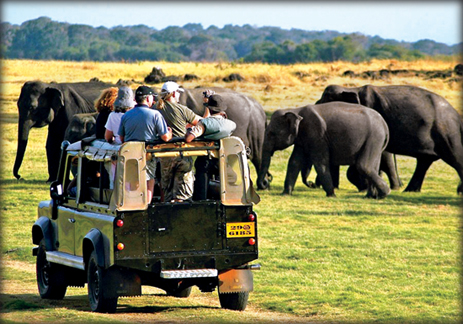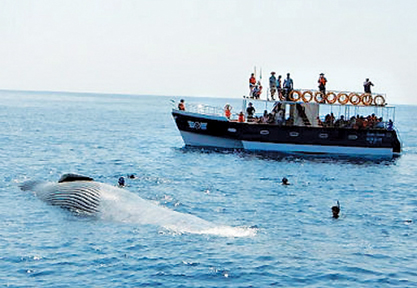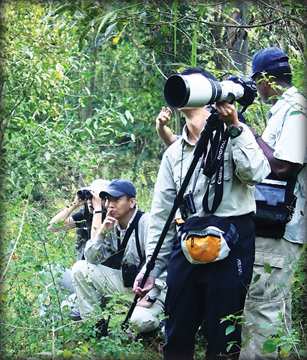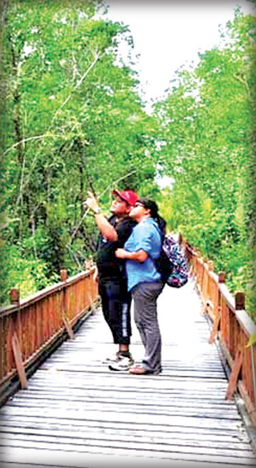|

In Minneriya Wildlife Reserve |
World Wildlife Day on March 3:
End wildlife crime before it’s too late
By Dhaneshi Yatawara
As the United Nation’s World wildlife Day falls on March 3, Sri
Lankan Wildlife officials are on alert on our country becoming a transit
point for the world’s fifth most profitable illegal trade, wildlife. It
only falls behind of counterfeiting, drugs, guns and human trafficking.
The illegal wildlife trade is one of the biggest threats to the
survival of some of the world’s most threatened species. In fact it’s
second only to habitat destruction in overall threats against species
survival, according to experts.
Thus, the world wildlife is specially recognised on March 3 which is
the anniversary of the CITES - the Convention on International Trade in
Endangered Species of Wild Fauna and Flora.
This year the theme of the World Wildlife Day is ‘Wildlife crime is
serious; Let’s get serious about wildlife crime’. Wildlife crime is a
big business. Run by dangerous international networks. By its very
nature, it has become almost impossible for conservationists to obtain
reliable figures for the value of illegal wildlife trade.
Sri Lanka is still among the top 25 bio diversity hot spots of the
world. And on a daily basis we read or hear news reported on plants,
animals or biological parts of them being smuggled out of the country
through various means to be sold in the world black market.
Legislation is a vital way to control wildlife trade, but to be
successful, laws need to be widely understood, accepted and practical to
apply.
|

Whale watching in Mirissa |
According to Environment Lawyer and Chairman of the Sri Lanka
Environment Council Jagath Gunawardane, the laws and regulations are
strong enough yet we still lag behind in proper implementation. Can we
be happy about the protection of the Sri Lankan wildlife? Not yet, as
Gunawardane said. “We have a long way to go,” he said.
“There should be a conducive environment for the law enforcement and
wildlife officials to do their job,” Gunawardane said. And at the same
time, corrupt officials, caught in scandals must be brought under the
law and action taken against them, he said.
“Considering the present situation politicians not getting involved
alone will not solve problems. There should be political will and
motivation to officers to take the right actions,” he said.
“Wildlife crime became a significant problem around eight to ten
years ago,” he added. There are many aspects that we need to be
concerned if we are to protect our wildlife from becoming a victim of
the crime.
Law enforcement is one aspect. Sri Lankan environment protecting laws
are strong enough. Fauna and Flora Protection Ordinance, Environment Act
and Fisheries and Aquatic resource Act play a main role in protecting
the environment.
The constitution of Sri Lanka under the Principles of State policy
and Fundamental duties proclaim “The state shall protect, preserve and
improve the environment for the benefit of the community”.
 It also states that “The duty and obligation of every person in Sri
Lanka to protect nature and conserve its riches”, thus showing the
commitment by the state and obligations of the citizens. Sri Lanka is
one of the leading countries in the South Asian region in enacting
environmental legislation. It also states that “The duty and obligation of every person in Sri
Lanka to protect nature and conserve its riches”, thus showing the
commitment by the state and obligations of the citizens. Sri Lanka is
one of the leading countries in the South Asian region in enacting
environmental legislation.
Charismatic species such as elephants are a huge tourist attraction
and are an important source of revenue in many countries. Thus today’s
talk is Eco tourism. As Gunawardane explained, tourism also has a
negative impact on the protection of the wildlife.
Among the tourists there can be some who tour the world in search of
animals, plants or their biological parts and genetic material which are
noted to be expensive in the international market.
Some smuggle it for scientific purposes. Biological hot spots such as
Sri Lanka are prime concerns of theirs. Thus tourism do have an impact
on promoting wildlife crimes even if we convert it to Eco tourism.
Wildlife criminals can come as tourists making every tourist a
suspect. “Such wildlife criminals will be of three categories. There can
be tourists who habitually commit wildlife crime, those who would do it
once in their life and those who commit scientific crime,” he said.
Illegal traders
Some smuggle it for scientific purposes. Biological hot spots like
Sri Lanka are prime concerns of theirs.
As per the global trends ecotourism is an effective vehicle for
empowering local communities around the world to fight against poverty
and to achieve sustainable development. Sri Lankan wildlife parks play a
key role in eco tourism.
To be more efficient in conservation activities the Department of
Wildlife Conservation cautiously try to promote eco tourism. “It brings
value to the departments and institutes that are involved in
conservation and support the sustainability of the conservation
efforts,” said Director General of the DWC H.D. Ratnayake.
|

Lessons from Malaysian concepts |
With a number of national parks Sri Lanka is rich with an amazing
amount of endemic species and a prime tourist attraction is
whale-watching. Imagine getting this close to a colossal whale. In Sri
Lanka, tourists just do that. Asian elephants, leopards, sloth bears,
endangered wild boar, porcupines, anteaters and the purple-faced langur
are just a few examples of the animals that are found here. Sri Lanka is
also home to over 3,154 species of flowering plants, and over 200 types
of resident birds.
“With eco tourism, tourists can be encouraged to visit national
parks,” he said. Yes, it would be much better than seeing wild animals
in captivity and would help to end the silent suffering such animals.
Yet there are several other problems that come hand in hand. Rules
and regulations controlling the tourists and the tour guide – are they
being implemented effectively? How is the Department of Wildlife
Conservation (DWC) going to act on those?
In popular national parks in Sri Lanka and there are simply too many
jeeps vying for the best views at certain locations. One thing you do
not want in a national park is a traffic jam. But it happens. When
visitors are not allowed to step down from vehicles in a National park
safari-goers’ pause to picnic can create problen a headache.
“We have changed the management of such National parks and the first
thing we do is advise the tourist guides and safari jeep owners to
adhere to the regulations. If not depending on the severity of the crime
we have taken action - be it pausing their access to the park,” said
Ratnayake. This is just a part of controlling threats from wildlife
crime.
Eco tourism, when properly executed based on these principles,
exemplifies the benefits of socially and environmentally sound
sustainable development. Thus, today the question before Sri Lanka is
how to achieve it when wildlife crime continues to pose greater threats
on Sri Lankan biodiversity. And an answer is needed sooner than later.
|

